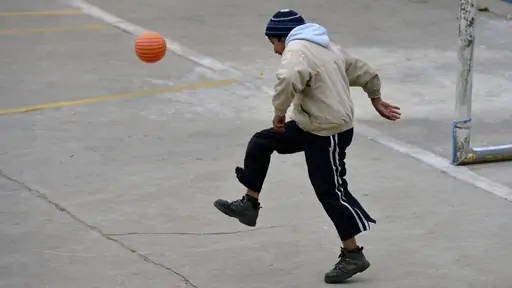Indigenous Calendar July, 2015: The K'iche' Maya Avoid Politics in Sport

A year ago the men's World Cup football competition was reaching its climax. The host nation, Brazil, appeared to be recovering from pre-tournament controversies that confirmed the role politics has come to play in sport. A year earlier domestic protest was ignited by an increase in the price of bus fares, which grew into the largest and most violent civil unrest Brazil had seen for many years.
But Brazil had made it to the semifinal to play against Germany and, for ninety minutes, at least, politics surrendered to sport. I watched the match live in Germany. The 7-1 outcome (in Germany's favor) was, according to some sports commentators, the greatest upset in the history of sport. Even the German crowd was in delighted shock.
A few months before the 2014 World Cup, controversy also surrounded the winter Olympic Games in Sochi, Russia. Few mainstream media outlets reported the local indigenous Circassian people's claim that "the Sochi Olympics is an 'outrage' because the event falls on the 150th anniversary of an alleged genocide by Russian troops in 1864..."
While that historical footnote to the 2014 winter Olympics will be forgotten before the medal winners are, it is perhaps time to remind ourselves of its already long-forgotten predecessor footnote from the Vancouver winter Olympics of 2010, in which Canada's First Nations peoples claimed that "British Columbia is, as a matter of fact, illegally occupied Native territory."
In the case of the 2014 World Cup, some of the controversy was focused on the cost of hosting the event in contrast to the poverty in Brazil's favelas. But whereas the indigenous people's issues of Sochi, 2014 were almost lost in the confusion, they were much more widely reported in the case of Brazil, 2014. Predictably, protests were organized by representatives of Brazil's indigenous peoples and aimed at garnering media attention.
In the last year both football and Brazil have experienced events that confirm the interplay of sport and politics. Dilma Rousseff was re-elected Brazilian president just a few months after the World Cup. But within five months Brazilians swarmed into the streets calling for her resignation or impeachment. Her approval rating has fallen to a record low. The state-run oil company, Petrobras, has been a large source of her problems. In 2014 it lost US$ 7.1 billion. Even worse, it was — and still is — caught up in a corruption scandal on an historic scale. Only a few days ago it announced a 37% decline in projected investment over the next four years — a move that will severely impact an already shrinking economy. Perhaps almost as bad for the national psyche, the men's football team recently squandered a chance to redeem itself when it lost in the quarterfinal stage of the Copa América football tournament. They probably felt little solace when the German football team was eliminated from the 2015 women's World Cup football tournament just a few hours ago.
The governing body of world football, the Federation of International Football Associations, has had a similarly bad year. Like Petrobras, it is caught up in a corruption scandal on an historic scale. Its president, Sepp Blatter, was forced to resign over the scandal and two criminal investigations of its officials are underway.
Whenever I visit an indigenous village I invariably see young boys playing football. They rarely have proper equipment and sometimes don't even have a real ball. Yet they see football, more than anything else and against all realistic odds, as a way out of poverty. It was no different when I recently visited a small K'iche' Maya village in Guatemala. The boys playing football that day did not have political opinions — they only wanted to play.
Politics will always be present in sport. Its next major presence is scheduled for a year from now when Brazil hosts the 2016 summer Olympic Games.
The K'iche' Maya are featured in our documentary, Ancient and Modern Mayan Peoples.
If you enjoyed reading this article, please consider supporting independent, advertising-free journalism by buying us a coffee to help us cover the cost of hosting our web site. Please click on the link or scan the QR code. Thanks!


